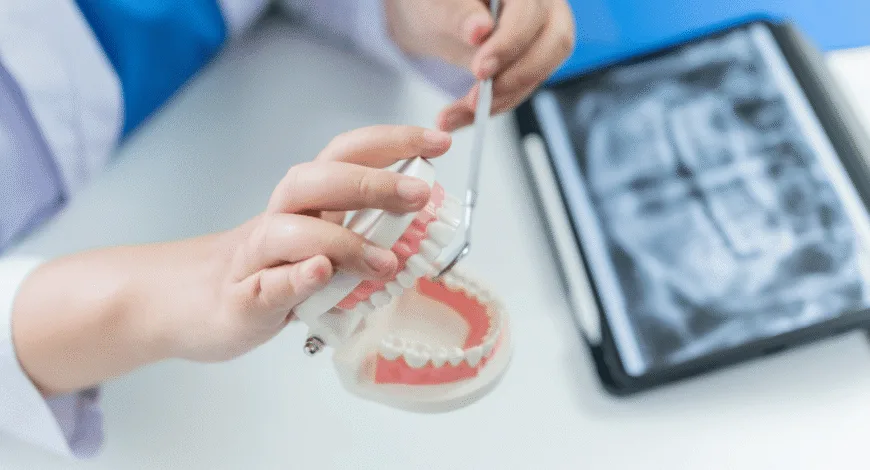As we age, we rightfully prioritize our health and quality of life. For many, this includes addressing long-standing dental issues, such as missing teeth or struggling with uncomfortable, unreliable dentures. The search for a better, more permanent solution inevitably leads to dental implants—the gold standard for tooth replacement.
But for many older adults, this promising solution is often met with a moment of hesitation and a single, critical question: “Am I too old for dental implants?”
It’s a concern we hear often in our Delhi dental clinic. Patients in their 60s, 70s, and 80s worry that their age might automatically disqualify them, that surgery might be too strenuous, or that their bodies won’t heal like they used to.
Let us be perfectly clear and put this concern to rest: There is no upper age limit for dental implants. We have successfully and routinely placed dental implants in patients in their 70s, 80s, and even 90s, with remarkable, life-changing results.
The key to a successful dental implant is not found on your birth certificate. The real question is not “How old are you?” but “How healthy are you?” This guide will explain why your overall health is the true determining factor, address the unique concerns of older patients, and explore the incredible, tangible benefits that dental implants can bring to your golden years.
The Real Determining Factor: It’s Your Health, Not Your Birthdate
The success of a dental implant hinges on a natural biological process called osseointegration, where the jawbone fuses with the biocompatible titanium implant, creating a rock-solid foundation. For this to happen, the body needs to be able to heal effectively. Therefore, a surgeon’s assessment for candidacy is focused on your health profile, not your age.
Here are the key health factors we evaluate:
1. Management of Chronic Conditions: Many older adults manage chronic health conditions. In most cases, these are not a barrier to getting dental implants, provided they are well-controlled.
- Diabetes: Uncontrolled diabetes can impair healing and increase the risk of infection. However, a patient whose diabetes is well-managed through diet, exercise, and medication, and who has a stable blood sugar level (HbA1c), is often an excellent candidate.
- Hypertension (High Blood Pressure): As long as your blood pressure is controlled with medication and monitored by your physician, it typically poses no problem for this minor surgical procedure.
- Osteoporosis: This condition affects bone density. While it is a significant consideration, it does not automatically disqualify you. We use advanced 3D CBCT scans to precisely measure the bone density in your jaw, and we may coordinate with your physician regarding your medications (like bisphosphonates) to ensure a safe and successful outcome.
2. Jawbone Health and Density: A successful implant needs a solid foundation of bone to integrate with. Long-term tooth loss or poorly fitting dentures can lead to significant bone resorption. A 3D scan will give us a clear picture of your bone volume. If it is insufficient, this can often be corrected with a highly predictable bone grafting procedure.
3. Key Lifestyle Factors: Certain lifestyle habits have a much greater impact on implant success than age. Heavy smoking is one of the most significant risk factors, as it dramatically reduces blood flow to the healing tissues and can inhibit osseointegration.
4. Good Oral Hygiene: A successful implant requires a commitment to keeping the surrounding gums healthy. You must have the dexterity and willingness to maintain excellent oral hygiene through daily brushing and flossing.
In short, a healthy 80-year-old is a far better candidate for a dental implant than an unhealthy 50-year-old with uncontrolled diabetes who is a heavy smoker.
Addressing the Unique Concerns of Older Patients
We understand that considering any form of surgery in your later years brings a unique set of concerns. Let’s address them directly.
Concern: “Is the surgery too stressful for my body?” It’s important to understand that dental implant placement is considered a minor surgical procedure. It is typically performed in the dental chair under local anesthesia, meaning only the area being worked on is numb. There is no need for general anesthesia, which carries more risks for older adults. The procedure is often less traumatic and involves a quicker recovery than having a complicated tooth extraction.
Concern: “Will I heal properly at my age?” While it’s true that healing can be slightly slower as we age, extensive scientific research has shown that the osseointegration process works just as effectively in healthy older adults. The long-term success rates of dental implants in the elderly population are excellent and virtually identical to those in younger patients. Your body’s remarkable ability to heal and fuse bone to titanium does not diminish significantly with age, provided you are in good health.
Concern: “What about the medications I’m taking?” This is a vital part of the consultation. It is crucial to provide your dental surgeon with a complete list of all medications you are taking, both prescription and over-the-counter. Medications like blood thinners (e.g., Warfarin, Plavix) or bisphosphonates for osteoporosis require special consideration. Our specialists will work in close coordination with your general physician to create a safe and seamless treatment plan, which may involve temporarily adjusting your medication around the time of the procedure.
The Profound Quality-of-Life Benefits for Seniors
For older patients, dental implants are not just about aesthetics; they are about restoring fundamental aspects of health, function, and well-being. The benefits are often more profound for seniors than for any other age group.
1. Vastly Improved Nutrition and Overall Health: This is perhaps the most significant benefit. Loose, painful dentures make it difficult or impossible to eat a wide range of healthy foods. Seniors often default to soft, processed foods that are easier to chew but lack vital nutrients. This can lead to malnutrition and a decline in overall health.
Dental implants restore your chewing power to that of natural teeth. This allows you to once again enjoy crisp vegetables, fresh fruits, lean meats, and nuts—foods that are essential for maintaining muscle mass, bone health, and a strong immune system. Better nutrition leads directly to better systemic health.
2. Halting Bone Loss and Preserving Facial Structure: After teeth are lost, the jawbone begins to shrink. Over years, this bone loss causes the lower third of the face to collapse, leading to a sunken chin, wrinkled lips, and a prematurely aged appearance. Traditional dentures accelerate this process.
Dental implants are the only tooth replacement solution that stops this bone loss. By stimulating the jawbone like natural tooth roots, they preserve your facial structure and help you maintain a more youthful profile.
3. Restored Confidence and Social Engagement: The fear of an embarrassing denture slip can be debilitating. Many seniors avoid social situations like dining out with friends or laughing freely with their grandchildren. This can lead to social isolation and a diminished sense of self.
Implant-supported teeth are completely stable. They do not move. This restores the freedom to speak, laugh, and eat in public with complete confidence, encouraging a more active and joyful social life.
4. Unmatched Comfort and Convenience: Imagine a life free from the daily hassles of dentistry:
- No more messy, foul-tasting adhesives.
- No more painful sore spots from rubbing dentures.
- No more taking your teeth out and leaving them in a glass at night.
Implant-supported teeth are cared for right in your mouth, just like natural teeth, offering a level of convenience and comfort that is simply unattainable with removable dentures.
Top Searched FAQs About Dental Implants for Seniors
What is the success rate of dental implants in the elderly?
The success rate is exceptionally high, typically well over 95%. Studies comparing healthy patients over 65 to younger patients have found no statistically significant difference in long-term implant survival and success.
Is bone grafting safe for older patients?
Yes, bone grafting is a routine, predictable, and safe procedure for healthy older adults. It is often a necessary step to ensure there is a solid foundation for the implant, and it is performed with the same care and precision as the implant surgery itself.
How long is the recovery from dental implants for a senior?
The recovery timeline is very similar to that of a younger patient. You can expect 2-3 days of mild, manageable discomfort and some swelling. While the final healing of the bone may take slightly longer, the initial soft tissue recovery is generally swift, and most patients are back to their normal routines within a few days.
Can I get dental implants if I have osteoporosis?
Yes, in many cases. The key is a thorough evaluation of your jawbone with a 3D scan and close collaboration with your physician to manage your condition and any medications you are taking. Osteoporosis is a reason for careful planning, not automatic disqualification.
What are the best implant options for seniors with no teeth?
Two excellent options are popular:
- Implant-Retained Dentures (“Snap-in” Dentures): A full denture that snaps onto 2-4 implants for stability. It is removable for cleaning but very secure when worn. This is a significant upgrade from traditional dentures at a more accessible price point.
- Implant-Supported Bridge (Fixed “All-on-4”): A full arch of teeth that is permanently screwed onto 4-6 implants. It is not removable and offers the most natural function and feel.
Conclusion: A Healthier, Happier Life is Ageless
Your age should never be a barrier to receiving the highest standard of care. When it comes to dental implants, the science is clear: healthy older adults are excellent candidates who stand to gain immense benefits in health, function, and happiness.
This treatment is not about looking younger; it’s about living younger. It’s about enjoying a meal with family, laughing with friends, and facing the world with renewed confidence. It’s an investment in your well-being that pays dividends every single day.
You deserve to enjoy your life to the fullest, with a smile that is comfortable, confident, and completely functional. Don’t let a number hold you back.

